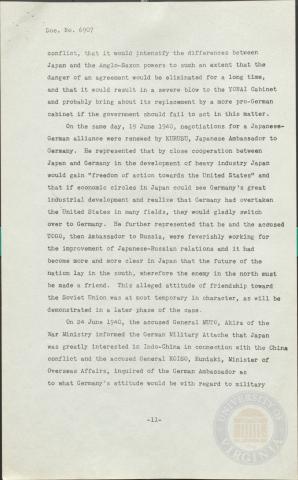
Page 11
| Parent | Doc. 6907 - Collaboration Between Japan, Germany and Italy, Volume 1 - Opening Statement |
|---|---|
| Date | |
| Language | English |
| Collection | Tavenner Papers & IMTFE Official Records |
| Box | Box 15 |
| Folder | Japan, Germany, Italy Collaboration Vol 1 |
| Repository | University of Virginia Law Library |
Doc. No. 6907
conflict, that it would intensify the differences between Japan and the Anglo-Saxon powers to such an extent that the danger of an agreement would be eliminated for a long time, and that it would result in a severe blow to the YONAI Cabinet and probably bring about its replacement by a more pro-German cabinet if the government should fail to act in this matter.
On the same day, 19 June 1940, negotiations for a Japanese- German alliance were renewed by KURUSU, Japanese Ambassador to Germany. He represented that by close cooperation between Japan and Germany in the development of heavy industry Japan would gain "freedom of action towards the United States" and that if economic circles in Japan could see Germany's great industrial development and realize that Germany had overtaken the United States in many fields, they would gladly switch over to Germany. He further represented that he and the accused TOGO, then Ambassador to Russia, were feverishly working for the improvement of Japanese-Russian relations and it had become more and more clear in Japan that the future of the nation lay in the south, wherefore the enemy in the north must be made a friend. This alleged attitude of friendship toward the Soviet Union was at most temporary in character, as will be demonstrated in a later phase of the case.
On 24 June 1940, the accused General MUTO, Akira of the War Ministry informed the German Military Attache that Japan was greatly interested in Indo-China in connection with the China conflict and the accused General K01S0, Kuniaki, Minister of Overseas Affairs, inquired of the German Ambassador as to what Germany's attitude would be with regard to military
